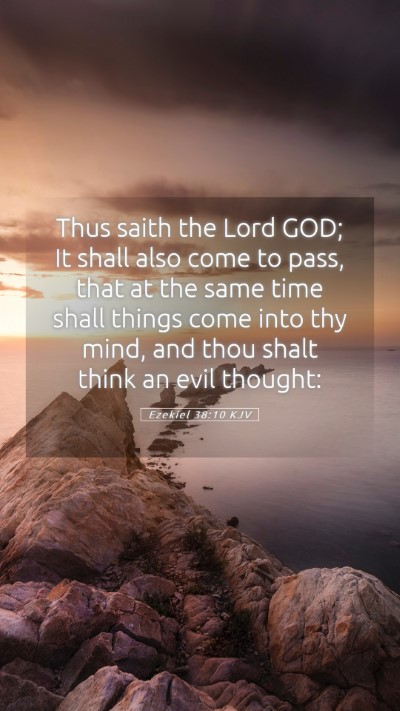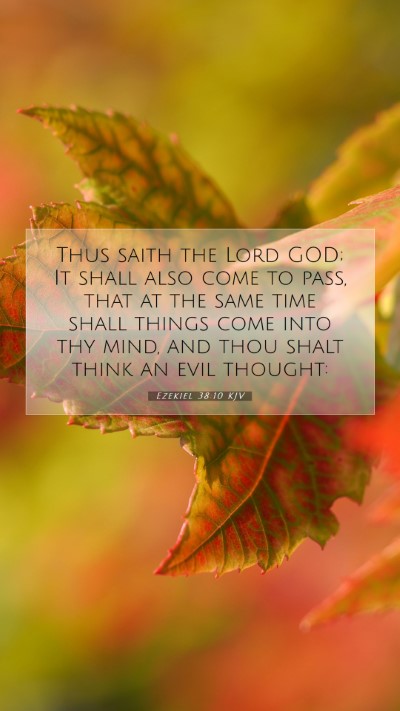Bible Verse Commentary on Ezekiel 38:10
Ezekiel 38:10 states, "Thus says the Lord God: On that day, thoughts will arise in your mind, and you will devise an evil scheme." This verse presents a prophetic declaration regarding a future invasion by Gog, a leader of Magog, and reflects deeper themes of divine sovereignty, human wickedness, and prophetic foresight. This commentary delves into the meaning of this scripture, drawing insights from esteemed public domain commentaries such as those by Matthew Henry, Albert Barnes, and Adam Clarke.
Understanding the Context
The context of Ezekiel 38:10 is critical for a comprehensive understanding. The chapter describes a future battle involving Gog, who symbolizes nations opposing God's people. Matthew Henry emphasizes the significance of divine knowledge of human intentions and the plans that arise within the hearts of men. This understanding aligns with Albert Barnes' assertion that the passage illustrates God's foreknowledge of malevolent human actions which He allows for His sovereign purposes.
Verse Breakdown and Insights
-
Divine Sovereignty:
This verse underscores God's control over human affairs. He knows the thoughts and intentions that will arise in the hearts of nations and individuals, highlighting not only the power of God but His intimate involvement in human history.
-
Human Scheming:
The "evil scheme" refers to the insidious plans hatched by Gog and his allies against God's people. Adam Clarke points out that this is indicative of a broader principle: humanity's innate tendency to conspire against righteousness.
-
Prophetic Certainty:
The phrase "thoughts will arise" suggests a prophetic certainty about future events. This aligns with the notion found in biblical exegesis that God's prophecies hold intrinsic truth, regardless of human resistance or opposition.
-
Symbolism:
Ezekiel uses imagery richly adorned with symbolism, reflecting the spiritual and physical conflict between good and evil. This aspect is discussed in depth by Barnes, who notes that Gog represents not merely a historical figure but a principle of opposition against God’s people.
Application to Daily Life
For contemporary readers, Ezekiel 38:10 serves as a poignant reminder of the reality of evil plans and their origin in human hearts. Understanding the implications of this verse is vital for individuals seeking to navigate their moral and spiritual landscapes. Recognizing that God is aware of these schemes can be both a comfort and a call to vigilance.
Cross References
Related verses that enhance the understanding of Ezekiel 38:10 include:
- Proverbs 21:30: "There is no wisdom, no insight, no plan that can succeed against the Lord."
- Revelation 20:8: Referring to the deceptive schemes of Satan in the last days.
- Jeremiah 11:15: Discussing the treachery of God's people against Him.
Conclusion
In summary, Ezekiel 38:10 serves as a critical piece in the puzzle of biblical prophecy and human behavior. It encourages believers to seek a deeper understanding of Scripture through thorough analysis and reflection. This verse exemplifies the richness found within biblical texts and invites further study on how such messages can be applied to everyday life. As we engage in Bible study groups or utilize various Bible study tools, the insights from Ezekiel 38:10 can significantly deepen our knowledge and appreciation of biblical narratives.


